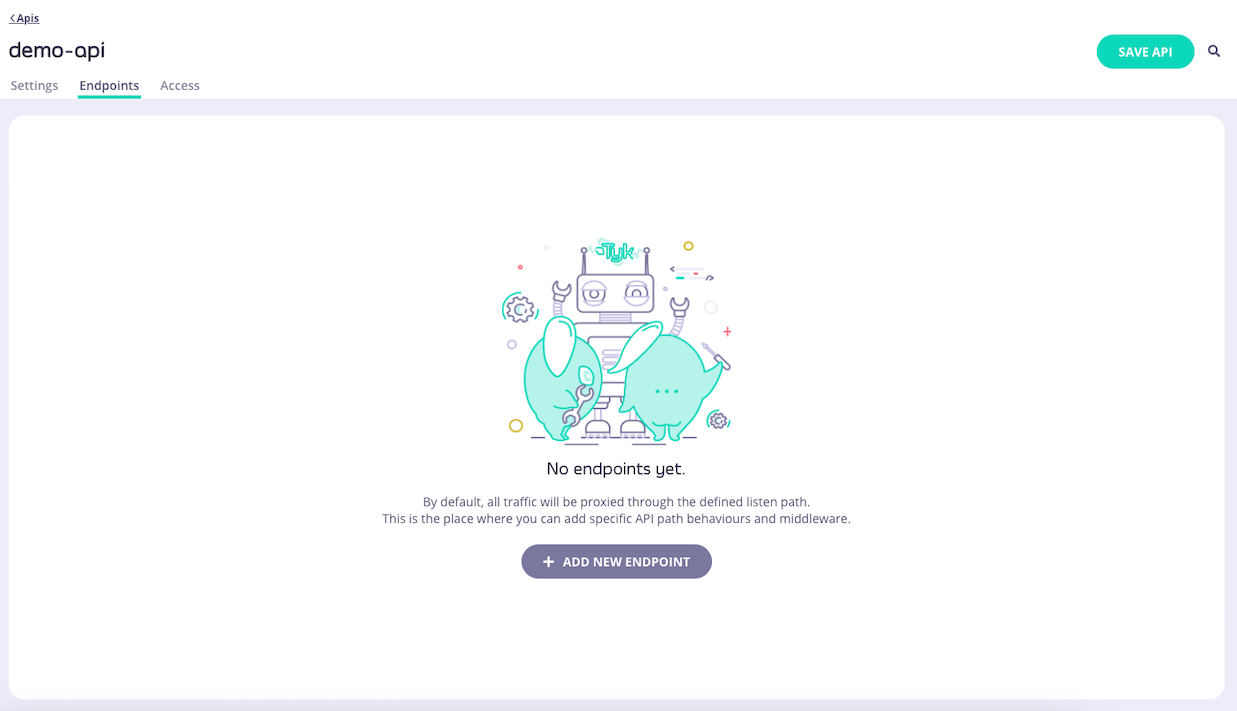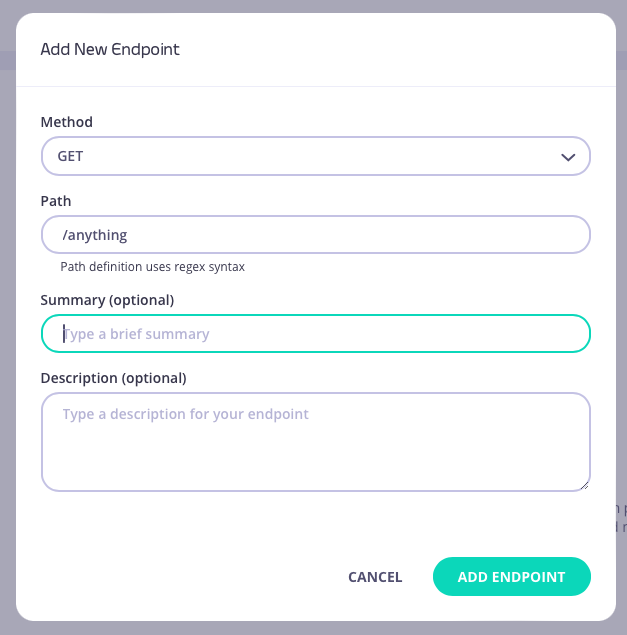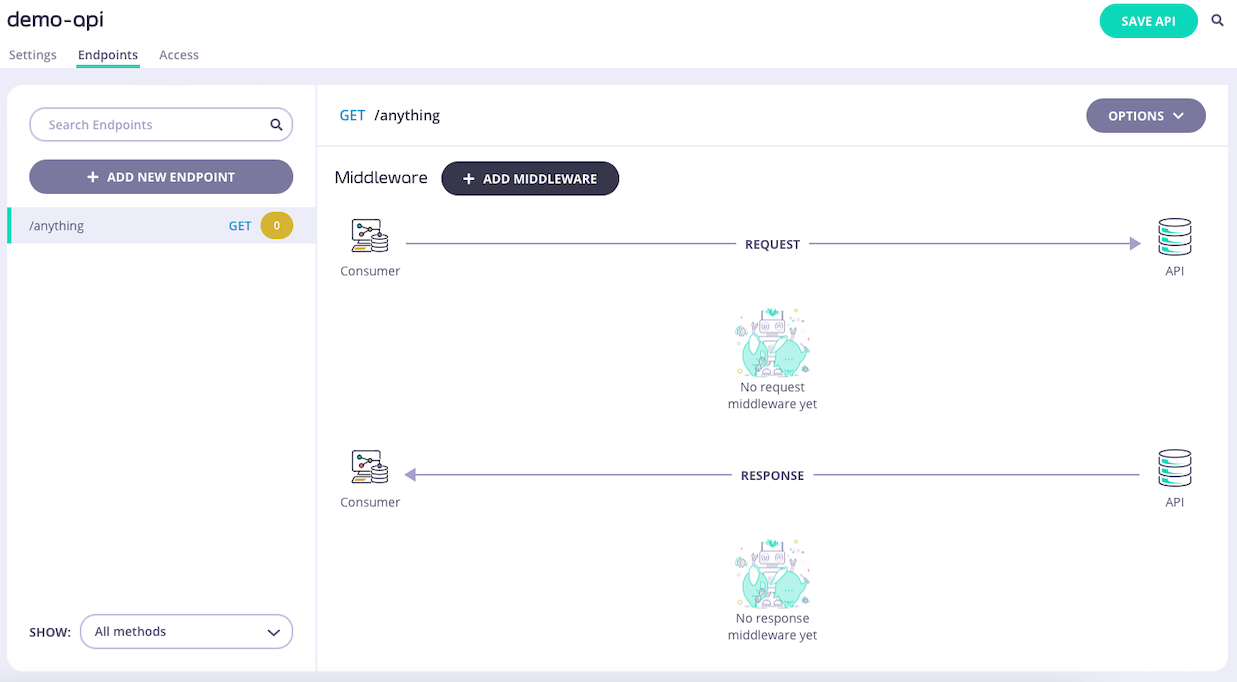Overview
The Internal Endpoint middleware instructs Tyk Gateway to ignore external requests to the endpoint (which is a combination of HTTP method and path). Internal requests from other APIs will be processed.Use Cases
Internal routing decisions
Internal endpoints are frequently used to make complex routing decisions that cannot be handled by the standard routing features. A single externally published endpoint can receive requests and then, based on inspection of the requests, the URL rewrite middleware can route them to different internal endpoints and on to the appropriate upstream services.Working
When the Internal Endpoint middleware is configured for a specific endpoint, it instructs the Gateway to ignore requests to the endpoint that originate from outside Tyk. An internal endpoint can be targeted from another API deployed on Tyk using thetyk:// prefix instead of http://.
For example, if GET /status/200 is configured to be an Internal Endpoint on the listen path http://my-tyk-install.org/my-api/ then external calls to this endpoint will be rejected with HTTP 403 Forbidden. Other APIs on Tyk will be able to direct traffic to this endpoint by setting their target_url to tyk://my-api/status/200.
Addressing an internal endpoint
An internal endpoint can be addressed using three different identifiers in the formattyk://{identifier}/{endpoint}.
The options for the identifier are:
self(only if the endpoint is in the same API)api_id(the unique API Identifier assigned to the API within Tyk)- listen path (the listen path defined for the API)
| api_id | listen path | Endpoint 1 | Endpoint 2 (with internal endpoint middleware) |
|---|---|---|---|
| f1c63fa5177de2719 | /api1 | endpoint1_ext | endpoint1_int |
| 2e90b33a879945918 | /api2 | endpoint2_ext | endpoint2_int |
/api1/endpoint1_int will be rejected with HTTP 403 Forbidden, since this is an internal endpoint.
This endpoint could, however, be called from within either endpoint in /api2 as either:
tyk://api1/endpoint1_inttyk://f1c63fa5177de2719/endpoint1_int
/api1/endpoint1_ext as:
tyk://api1/endpoint1_inttyk://f1c63fa5177de2719/endpoint1_inttyk://self/endpoint1_int
Using Tyk OAS
The Internal Endpoint middleware instructs Tyk Gateway not to process external requests to the endpoint (which is a combination of HTTP method and path). Internal requests from other APIs will be processed. When working with Tyk OAS APIs, the middleware is configured in the Tyk OAS API Definition. You can do this via the Tyk Dashboard API or in the API Designer. If you’re using the legacy Tyk Classic APIs, then check out the Tyk Classic page.API Definition
The design of the Tyk OAS API Definition takes advantage of theoperationId defined in the OpenAPI Document that declares both the path and method for which the middleware should be added. Endpoint paths entries (and the associated operationId) can contain wildcards in the form of any string bracketed by curly braces, for example /status/{code}. These wildcards are so they are human readable and do not translate to variable names. Under the hood, a wildcard translates to the “match everything” regex of: (.*).
The internal endpoint middleware (internal) can be added to the operations section of the Tyk OAS Extension (x-tyk-api-gateway) in your Tyk OAS API Definition for the appropriate operationId (as configured in the paths section of your OpenAPI Document).
The internal object has the following configuration:
enabled: enable the middleware for the endpoint
- the internal endpoint middleware has been configured for requests to the
GET /anythingendpoint - the URL rewrite middleware has been configured for requests to the
GET /redirectendpoint
GET /example-internal-endpoint/anything will be rejected, with Tyk returning HTTP 403 Forbidden, since the /anything endpoint is internal.
Any calls made to GET /example-internal-endpoint/redirect will be redirected to GET /example-internal-endpoint/anything. These will be proxied to the upstream because they originate from within Tyk Gateway (i.e. they are internal requests) - so the response from GET http://httpbin.org/anything will be returned.
The configuration above is a complete and valid Tyk OAS API Definition that you can import into Tyk to try out the internal endpoint middleware.
API Designer
Adding the Internal Endpoint middleware to your API endpoints is easy when using the API Designer in the Tyk Dashboard, simply follow these steps:-
Add an endpoint
From the API Designer add an endpoint that matches the path and method to which you want to apply the middleware.



-
Select the Internal Endpoint middleware
Select ADD MIDDLEWARE and choose the Internal middleware from the Add Middleware screen.

- Save the API Select SAVE API to apply the changes to your API.
Using Classic
The Internal Endpoint middleware instructs Tyk Gateway not to process external requests to the endpoint (which is a combination of HTTP method and path). Internal requests from other APIs will be processed. When working with Tyk Classic APIs, the middleware is configured in the Tyk Classic API Definition. You can do this via the Tyk Dashboard API or in the API Designer. If you’re using the newer Tyk OAS APIs, then check out the Tyk OAS page. If you’re using Tyk Operator then check out the configuring the middleware in Tyk Operator section below.API Definition
To enable the middleware you must add a newinternal object to the extended_paths section of your API definition.
The internal object has the following configuration:
path: the endpoint pathmethod: the endpoint HTTP method
GET requests to the /status/200 endpoint. Any requests made to this endpoint that originate externally to Tyk will be rejected with HTTP 403 Forbidden. Conversely, the endpoint can be reached internally by another API at tyk://<listen_path>/status/200.
API Designer
You can use the API Designer in the Tyk Dashboard to configure the internal endpoint middleware for your Tyk Classic API by following these steps.-
Add an endpoint for the path and select the plugin
From the Endpoint Designer add an endpoint that matches the path that you wish to set as internal. Select the Internal plugin.

- Save the API Use the save or create buttons to save the changes and activate the middleware.
Tyk Operator
The process for configuring the middleware in Tyk Operator is similar to that explained in configuring the middleware in the Tyk Classic API Definition. The middleware can be configured by adding a newinternal object to the extended_paths section of your API definition.
In the example below the internal endpoint middleware has been configured for HTTP GET requests to the /status/200 endpoint. Any requests made to this endpoint that originate externally to Tyk will be rejected with HTTP 403 Forbidden. Conversely, the endpoint can be reached internally by another API at tyk://<listen_path>/status/200.